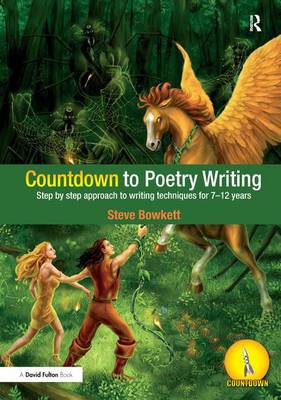Countdown
3 total works
Developing children's writing abilities boosts their confidence, creates enjoyment and relevance in the task and cultivates a range of decision-making and problem-solving skills that can then be applied across the curriculum. The Countdown series provides all the support you need in helping children to improve their prose, poetry and...
Read moreDeveloping children's writing abilities boosts their confidence, creates enjoyment and relevance in the task and cultivates a range of decision-making and problem-solving skills that can then be applied across the curriculum. The Countdown series provides all the support you need in helping children to improve their prose, poetry and non-fiction writing.
This guide provides all the support you need in helping pupils to improve their poetry writing. Countdown to Poetry Writing is a comprehensive and flexible resource that you can use in different ways, including:
- stand-alone modules that cover all the essential aspects of writing a poem, including word play, use of metaphor, rhyme and many others
- countdown flowchart providing an overview showing how modules are linked and how teachers can progress through them with the pupils
- photocopiable activity sheets for each module that show how to make the decisions and solve the problems that all writers face along the road from first idea to finished piece of work
- teachers’ notes for modules, with tips and guidance, including how modules can be used in the classroom, links to other modules and curriculum links, and advice on helping and guiding pupils in their writing
- a self-study component so that children can make their own progress through the materials, giving young writers a sense of independence in thinking about their work and offering built-in scaffolding of tasks so that less experienced or less confident children get more support from the resource
- 'headers' for each module showing where along the 'countdown path' you are at that point.
In short, Countdown to Poetry Writing saves valuable planning time and gives you all the flexibility you need - teachers might want to utilise either the self-study or 'countdown' aspects of the book, or simply dip into it for individual lesson activities to fit in with their own programmes of work.
Developing children's writing abilities boosts their confidence, creates enjoyment and relevance in the task and cultivates a range of decision-making and problem-solving skills that can then be applied across the curriculum. The Countdown series provides all the support you need in helping children to improve their prose, poetry and...
Read moreDeveloping children's writing abilities boosts their confidence, creates enjoyment and relevance in the task and cultivates a range of decision-making and problem-solving skills that can then be applied across the curriculum. The Countdown series provides all the support you need in helping children to improve their prose, poetry and non-fiction writing.
Countdown to Non-Fiction Writing is a comprehensive and flexible resource which you can use in different ways. It includes:
37 stand-alone modules which cover all aspects of writing and understanding non-fiction texts, including the nature of language, logical thinking, recognising 'facts' and planning;
A countdown flowchart provides an overview, showing how modules are linked and allowing teachers and pupils to track their progress;
Photocopiable activity sheets for each module that show how to make decisions and solve problems which writers face on the journey to a finished piece of work;
Teachers' notes for each module with tips and guidance, including how modules can be used in the classroom, links to other modules and curriculum links, and advice on helping and guiding pupils in their writing;
A self-study component so pupils can make their own progress through the material. This option gives young writers a sense of independence in thinking about their work and through offering a scaffolding of tasks, encourages confident and effective writing;
'Headers' for each module showing where along the 'countdown path' you are at that point;
Contents page for quick access to particular modules and relevant aspects of writing.
In short, Countdown to Non-Fiction Writing saves valuable planning time and gives you all the flexibility you need in helping pupils to prepare for, understand, and write non-fiction. The structure of the book allows teachers to utilise the modules for 'self-study', as a longer programme following the 'countdown' structure, or to dip into the book for individual lesson activities and ideas to fit in with wider programmes of study.

